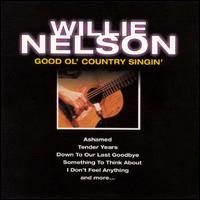"Have I Told You Lately That I Love You?" is a popular song written by Scotty Wiseman for the 1944 musical film, Sing, Neighbor, Sing and performed by Lulu Belle and Scotty. It was their greatest hit and one of the first country music songs to attract major attention in the pop music field. Although the song was featured in the movie, it was not released by Lulu Belle and Scotty until 1947. The first released version of this song was by Gene Autry in 1945.

Honky Tonk Heroes is a country music album by Waylon Jennings, released in 1973 on RCA Victor. With the exception of the final track on the album, "We Had It All", all of the songs on the album were written or co-written by Billy Joe Shaver. The album is considered an important piece in the development of the outlaw sub-genre in country music as it revived the honky tonk music of Nashville and added elements of rock and roll to it.

Wanted! The Outlaws is a compilation album by Waylon Jennings, Willie Nelson, Jessi Colter, and Tompall Glaser, released by RCA Records in 1976. The album consists of previously released material with four new songs. Released to capitalize on the new outlaw country movement, Wanted! The Outlaws earned its place in music history by becoming the first country album to be platinum-certified, reaching sales of one million.

Waylon & Willie is a duet studio album by American singers Waylon Jennings and Willie Nelson, released by RCA Records in 1978. In the US, it stayed at #1 album on the country album charts for ten weeks and would spend a total of 126 weeks on the country charts.
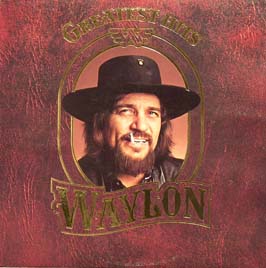
Greatest Hits is a compilation album by American country music artist Waylon Jennings, released in 1979 by RCA Records.
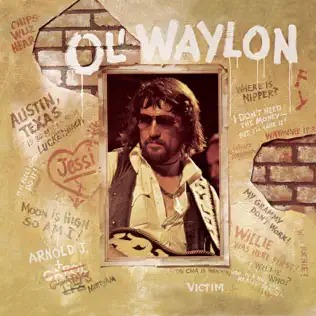
Ol' Waylon is a studio album by American country music artist Waylon Jennings, released on RCA Victor in 1977. It eventually became one of Jennings' highest-selling albums, due in no small part to the phenomenal success of the chart-topping "Luckenbach, Texas ." It was also the singer's fourth solo album in a row to reach the top of the country charts, remaining there for thirteen weeks and becoming country music's first platinum album by any single solo artist.

What Goes Around Comes Around is a studio album by American country music artist Waylon Jennings, released on RCA Victor in 1979.

Here Comes My Baby is a studio album by American country music artist Dottie West. It was released in June 1965 on RCA Victor Records and was produced by Chet Atkins. It was West's debut studio album as a recording artist and was issued following the success of the title track in 1964. The latter song won a Grammy Award in early 1965 which prompted the issue of the album. Here Comes My Baby would start a series of studio recordings West would release for RCA.

The discography of American country artist Skeeter Davis contains 32 studio albums, 18 compilation albums, 59 singles, 53 lead singles, six collaborative singles, two other charted songs and two additional appearances. Davis was first one half of the duo, The Davis Sisters before embarking on a solo career with the RCA Victor label. Her second single was 1957's "Lost to a Geisha Girl", which reached the top 15 of the American Billboard Hot Country Songs chart. It was followed in 1959 by the top five country selection, "Set Him Free". The same year, Davis's debut studio album was issued on RCA Victor titled I'll Sing You a Song and Harmonize Too. Her career momentum continued to build in 1960 with two top five back-to-back singles: "(I Can't Help You) I'm Falling Too" and "My Last Date ". Both selections also climbed into the Billboard Hot 100 top 40. They were featured on Davis's second studio album called Here's the Answer. Between 1961 and 1962, Davis had top ten Billboard country singles with "Optimistic" and "Where I Ought to Be".

Willie – Before His Time is a 1977 album by country singer Willie Nelson. The album features songs previously recorded by Nelson during the 1960s and early 1970s, re-released in order to take advantage of the popularity he gained during the mid-1970s.

What Can You Do to Me Now is a 1975 album by country singer Willie Nelson.

Country Willie is a 1975 compilation album by country singer Willie Nelson. It was issued by United Artists Records, the successor label to Liberty Records.

Spotlight on Willie Nelson is a 1974 compilation album by country singer Willie Nelson.

The Willie Way is the 15th studio album by country singer Willie Nelson. This was also the last album of new material released by RCA Records before Nelson's departure for Atlantic Records and move to Austin, Texas.

Yesterday's Wine is the 13th studio album and a concept album by country singer Willie Nelson. Nelson had been recording for RCA Victor since the early 1960s, and had released no significant hit records. By 1970, his recordings had reached mid-chart positions. Nelson lost the money he made from his song-writing royalties by financing concert tours that were generally unsuccessful and unprofitable. In addition to problems with his music career, Nelson had a troubled personal life. He had divorced his wife, Shirley Collie, and his Tennessee ranch had been destroyed by a fire.

Willie Nelson and Family is the twelfth studio album by American country music singer Willie Nelson, released in 1971.

Good Times is the eighth studio album by American country music singer Willie Nelson, released in 1968. Arrangements were by Anita Kerr, Bill Walker and Ray Stevens.
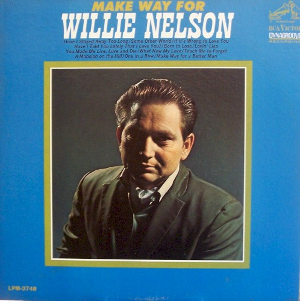
Make Way for Willie Nelson is the fifth studio album by country singer Willie Nelson.
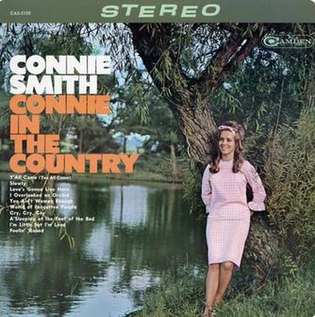
Connie in the Country is the seventh studio album by American country singer Connie Smith. It was released in February 1967 via the RCA Camden label and contained ten of tracks of material. It was her first to be released on RCA's budget Camden label. Unlike other RCA Camden albums, the project consisted of new recordings for Smith's catalog. This included the single, "Cry, Cry, Cry", which was a top 20 hit on the American country songs chart in 1968.
"I Walk Alone" is a song written by Herbert Wilson. and recorded by American country music artist, Eddy Arnold and was the B-side of his 78 rpm single "Did You See My Daddy Over There" (1945), and later for his compilation album Eddy Arnold Sings Them Again (1960).
